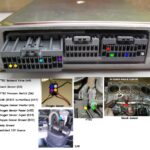The Best Bluetooth Obd2 Software For Pc empowers you to diagnose car issues, access real-time data, and even unlock hidden features. At MERCEDES-DIAGNOSTIC-TOOL.EDU.VN, we provide expert insights and solutions to help you make informed decisions and optimize your Mercedes-Benz. Discover superior diagnostic capabilities with our top-rated PC software.
Contents
- 1. Understanding OBD2 and Bluetooth Connectivity
- 1.1. What is OBD2?
- 1.2. Why Use Bluetooth OBD2 Software?
- 1.3. Intended Searches of best bluetooth obd2 software for pc
- 2. Key Features to Look for in OBD2 Software
- 2.1. Comprehensive Vehicle Diagnostics
- 2.2. User-Friendly Interface
- 2.3. Compatibility
- 2.4. Advanced Features
- 3. Top Bluetooth OBD2 Software for PC
- 3.1. TOAD Pro
- 3.2. AutoEnginuity ScanTool
- 3.3. PCMScan
- 3.4. ProScan
- 3.5. OBD Auto Doctor
- 3.6. Movi and Movi Pro
- 3.7. EOBD Facile
- 4. How to Choose the Right Software for Your Needs
- 4.1. Determine Your Diagnostic Needs
- 4.2. Consider Your Technical Expertise
- 4.3. Read Reviews and Compare Features
- 5. Step-by-Step Guide to Using Bluetooth OBD2 Software
- 5.1. Purchase a Bluetooth OBD2 Adapter
- 5.2. Install the OBD2 Software on Your PC
- 5.3. Connect the Bluetooth Adapter to Your Vehicle
- 5.4. Pair the Bluetooth Adapter with Your PC
- 5.5. Launch the OBD2 Software and Connect to Your Vehicle
- 5.6. Perform Diagnostics and Access Data
- 6. Benefits of Using MERCEDES-DIAGNOSTIC-TOOL.EDU.VN
- 6.1. Expert Guidance
- 6.2. Detailed Tutorials and Resources
- 6.3. Mercedes-Specific Expertise
- 6.4. Cost Savings
- 7. Unlocking Hidden Features on Your Mercedes-Benz
- 7.1. What are Hidden Features?
- 7.2. Software and Tools Required
- 7.3. Step-by-Step Guide to Unlocking Features
- 7.4. Precautions and Risks
- 8. Common Mercedes-Benz Maintenance Tasks
- 8.1. Oil Change
- 8.2. Brake Service
- 8.3. Tire Rotation and Alignment
- 8.4. Fluid Checks and Replacements
- 9. Frequently Asked Questions (FAQs)
- 9.1. What is the best Bluetooth OBD2 software for PC?
- 9.2. How do I connect my Bluetooth OBD2 adapter to my PC?
- 9.3. Can I use Bluetooth OBD2 software to unlock hidden features on my Mercedes-Benz?
- 9.4. What are the risks of using OBD2 software?
- 9.5. How often should I perform maintenance on my Mercedes-Benz?
- 9.6. What is live data monitoring?
- 9.7. What is a Diagnostic Trouble Code (DTC)?
- 9.8. Is it safe to clear DTCs without fixing the underlying problem?
- 9.9. What is freeze frame data?
- 9.10. Where can I find the OBD2 port in my vehicle?
- 10. Call to Action
1. Understanding OBD2 and Bluetooth Connectivity
1.1. What is OBD2?
OBD2, or On-Board Diagnostics II, is a standardized system that allows you to access your vehicle’s computer. According to the Environmental Protection Agency (EPA), OBD2 was implemented in all cars and light trucks in the United States in 1996 to monitor the performance of the engine and emissions systems. This standardization enables you to use a single device to diagnose a wide range of vehicles.
1.2. Why Use Bluetooth OBD2 Software?
Bluetooth OBD2 software offers several advantages:
- Wireless Connection: Bluetooth eliminates the need for cables, providing a cleaner and more convenient diagnostic process.
- Portability: You can move freely around the vehicle while monitoring data on your PC.
- Cost-Effective: Bluetooth OBD2 adapters and software are generally affordable, offering significant value compared to professional diagnostic tools.
- Ease of Use: Modern software interfaces are user-friendly, making it easier for both beginners and experienced users to diagnose issues.
1.3. Intended Searches of best bluetooth obd2 software for pc
When users search for “best Bluetooth OBD2 software for PC,” their intentions typically fall into these categories:
- Diagnostic Capability: Finding software that can accurately read and interpret OBD2 data to diagnose car problems.
- Feature Unlock: Identifying software that allows unlocking or customizing hidden features in their car.
- Real-Time Data: Seeking software that provides real-time monitoring of vehicle performance parameters.
- Cost-Effectiveness: Discovering affordable software options that don’t compromise on functionality.
- User-Friendliness: Finding software with an intuitive interface that is easy to use for both beginners and experts.
2. Key Features to Look for in OBD2 Software
2.1. Comprehensive Vehicle Diagnostics
The best OBD2 software should offer extensive diagnostic capabilities.
- Reading and Clearing Codes: Accurately read Diagnostic Trouble Codes (DTCs) and clear them after repairs.
- Live Data Monitoring: Monitor real-time data from various sensors, such as engine temperature, RPM, and vehicle speed.
- Freeze Frame Data: Access freeze frame data, which captures sensor values at the moment a DTC was triggered.
- Advanced Diagnostics: Support for advanced diagnostics, including O2 sensor tests, EVAP system tests, and misfire detection.
2.2. User-Friendly Interface
An intuitive interface is crucial for ease of use.
- Clear Data Presentation: Data should be displayed in a clear, understandable format, with customizable dashboards.
- Easy Navigation: The software should be easy to navigate, with logical menus and straightforward access to features.
- Reporting: Ability to generate and export diagnostic reports for further analysis or sharing with mechanics.
2.3. Compatibility
Ensure the software is compatible with your vehicle and operating system.
- Vehicle Support: Check that the software supports your car’s make and model. Many software options offer specific enhancements for certain brands, like Mercedes-Benz.
- Operating System: Verify compatibility with your PC’s operating system, whether it’s Windows, macOS, or Linux.
- Bluetooth Adapter: Ensure the software works seamlessly with your Bluetooth OBD2 adapter.
2.4. Advanced Features
Advanced features can significantly enhance your diagnostic capabilities.
- Bi-Directional Control: Some software offers bi-directional control, allowing you to send commands to your vehicle’s systems for testing and calibration.
- ECU Programming: Support for ECU programming or remapping, which allows you to customize your vehicle’s performance (use with caution and expertise).
- Data Logging: Ability to log data over time for detailed analysis of vehicle performance under various conditions.
- Customizable Parameters: Options to customize which parameters are displayed and how they are presented.
3. Top Bluetooth OBD2 Software for PC
3.1. TOAD Pro
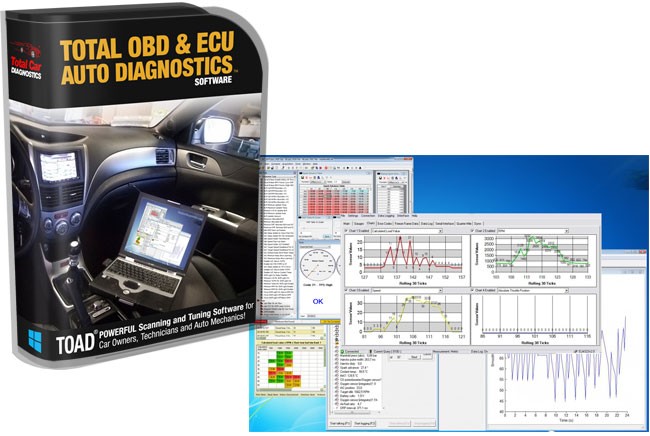 TOAD Pro OBD2 Software
TOAD Pro OBD2 Software
TOAD (Total OBD & ECU Auto Diagnostics) Pro is a comprehensive software package designed for both home users and professional mechanics. It offers extensive vehicle compatibility and advanced features.
- Key Features:
- Reads and clears DTCs
- Live data monitoring with customizable graphs
- ECU remapping capabilities
- Optimized for touch input
- Pros:
- Wide vehicle compatibility
- Advanced features for performance tuning
- User-friendly interface
- Cons:
- May be overwhelming for beginners
- Higher price point
3.2. AutoEnginuity ScanTool
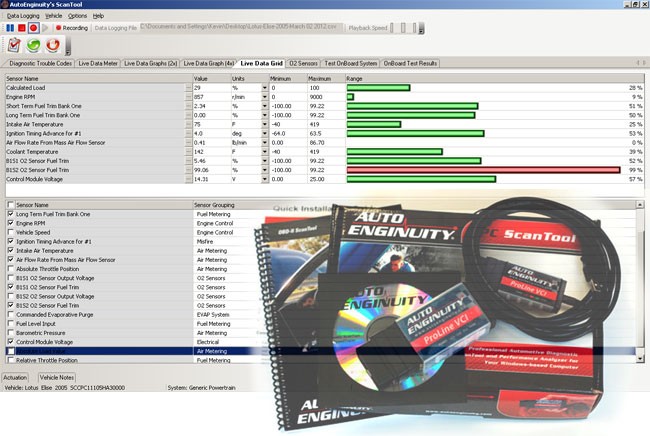 AutoEnginuity ScanTool OBD2 Software
AutoEnginuity ScanTool OBD2 Software
AutoEnginuity’s ScanTool is a professional-grade OBD2 software that offers brand-specific options and deep diagnostic coverage.
- Key Features:
- Brand-specific diagnostics (BMW, Ford, GM, Chrysler, etc.)
- Access to ABS, airbag, and transmission controllers
- Bi-directional controls and system tests
- Data logging in XML and CSV formats
- Pros:
- Extensive coverage and depth of diagnostics
- Customizable sensor data display
- Ideal for professional use
- Cons:
- High price
- May require a steep learning curve for beginners
3.3. PCMScan
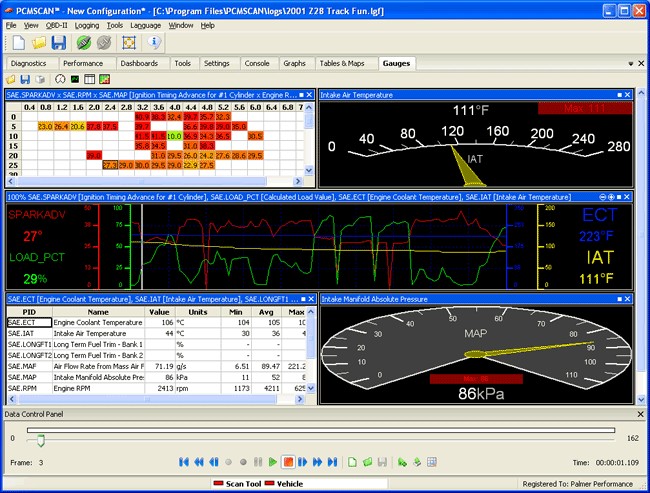 PCMScan OBD2 Software
PCMScan OBD2 Software
PCMScan is a fully featured generic OBD-II automotive diagnostic software that supports a wide variety of OBD hardware interfaces. It includes visual charting, logging, viewing and playback of recorded data in real time.
- Key Features:
- Customizable dashboard
- Dyno and drag features
- Data logging
- Javascripting support for custom calculations
- Pros:
- Supports a wide range of OBD hardware interfaces
- Configurable alerts system
- Dyno and drag features
- Cons:
- Hasn’t been updated in over 7 years
3.4. ProScan
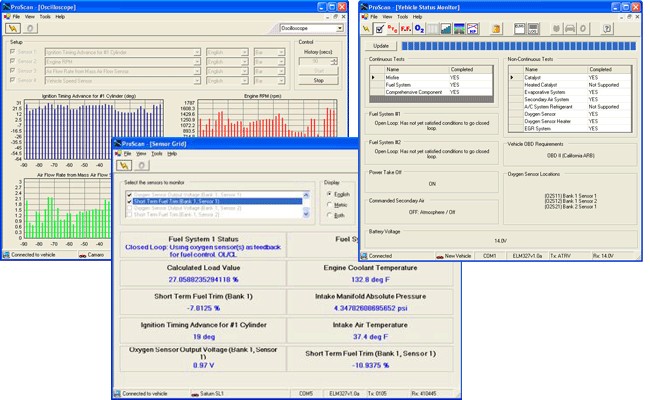 ProScan OBD2 Software
ProScan OBD2 Software
ProScan is a user-friendly OBD2 software known for its stability and accurate timing performance measurements.
- Key Features:
- Fuel economy adjustment
- Vehicle Connection Manager
- Oxygen sensor tests
- One-button diagnostic report generator
- Pros:
- User-friendly interface
- Accurate timing performance measurements
- Consistent stability and development
- Cons:
- Part of TOAD LITE package, may require additional purchase for full functionality
3.5. OBD Auto Doctor
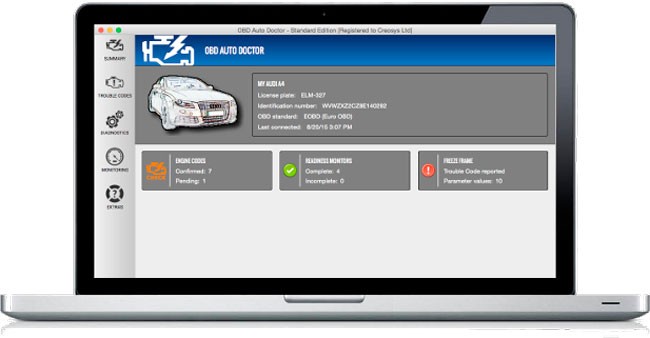 OBD Auto Doctor OBD2 Software
OBD Auto Doctor OBD2 Software
OBD Auto Doctor is a sophisticated OBD2 car diagnostic tool, considered one of the best for macOS.
- Key Features:
- DTCs, Freeze frame, MIL
- Fuel emission and fuel consumption monitoring
- Real-time indicators
- Built-in DTC database of over 14,000 alarm codes
- Pros:
- Sophisticated and clean interface
- Ultra resourceful in terms of extracted data
- Ideal for serious car enthusiasts
- Cons:
- May be too advanced for regular car owners
3.6. Movi and Movi Pro
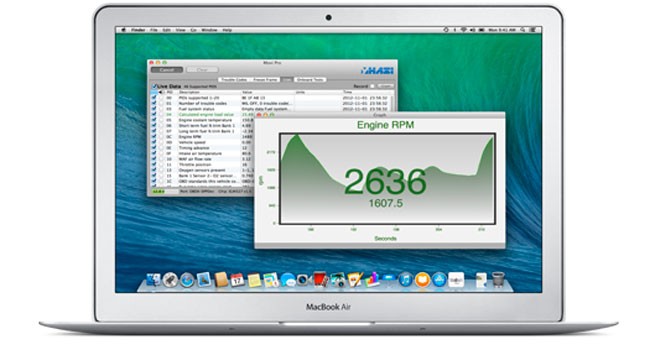 Movi Pro OBD2 Software
Movi Pro OBD2 Software
Movi/Movi Pro is designed for simplicity and reliability, offering easy access to vehicle data on macOS.
- Key Features:
- Real-time data monitoring
- Read/clear DTCs
- View/clear freeze frame data
- Fuel consumption and fuel economy monitoring
- Pros:
- Simple and easy to use
- Reliable data extraction
- Ideal for regular car owners
- Cons:
- Free version has limited functionality
- Paid version required to clear DTC fault codes
3.7. EOBD Facile
 EOBD Facile OBD2 Software
EOBD Facile OBD2 Software
EOBD Facile is a straightforward OBD software available in the App Store for macOS, offering easy setup and real-time diagnostics.
- Key Features:
- Clear check engine light
- View engine codes and their meanings
- Monitor manufacturer error codes
- GPS data logging
- Pros:
- Simple and easy to set up
- Real-time diagnostics
- Available in the App Store
- Cons:
- GUI interface may not be as appealing as other options
4. How to Choose the Right Software for Your Needs
4.1. Determine Your Diagnostic Needs
Consider what you want to achieve with the OBD2 software.
- Basic Diagnostics: If you only need to read and clear codes, a simpler, more affordable option may suffice.
- Advanced Diagnostics: If you need to monitor live data, perform advanced tests, or customize your vehicle’s performance, opt for a more comprehensive software package.
- Specific Vehicle Needs: Some software offers enhanced support for specific makes and models. If you own a Mercedes-Benz, look for software that offers Mercedes-specific diagnostics and features.
4.2. Consider Your Technical Expertise
Choose software that matches your technical skills.
- Beginner: Look for software with a user-friendly interface and clear instructions.
- Intermediate: Opt for software that offers a balance of features and ease of use.
- Advanced: Choose a professional-grade software package with advanced features and customization options.
4.3. Read Reviews and Compare Features
Research and compare different software options before making a decision.
- Read User Reviews: See what other users have to say about the software’s performance, features, and customer support.
- Compare Features: Create a list of your must-have features and compare how different software options stack up.
- Consider Cost: Balance the cost of the software with its features and capabilities.
5. Step-by-Step Guide to Using Bluetooth OBD2 Software
5.1. Purchase a Bluetooth OBD2 Adapter
Choose a reliable Bluetooth OBD2 adapter that is compatible with your vehicle and software. Popular options include:
- OBDLink MX+: Known for its fast speeds and compatibility with a wide range of vehicles.
- BlueDriver Bluetooth Professional OBDII Scan Tool: Offers comprehensive diagnostics and a user-friendly app.
- Veepeak Mini Bluetooth OBD2 Scanner: A compact and affordable option for basic diagnostics.
5.2. Install the OBD2 Software on Your PC
Download and install the OBD2 software on your PC, following the installation instructions provided by the software vendor.
5.3. Connect the Bluetooth Adapter to Your Vehicle
Locate the OBD2 port in your vehicle, typically found under the dashboard on the driver’s side. Plug the Bluetooth OBD2 adapter into the port.
5.4. Pair the Bluetooth Adapter with Your PC
Enable Bluetooth on your PC and pair it with the OBD2 adapter. The pairing process may vary depending on the adapter and your PC’s operating system.
5.5. Launch the OBD2 Software and Connect to Your Vehicle
Open the OBD2 software on your PC and select the Bluetooth adapter from the list of available devices. Follow the software’s instructions to connect to your vehicle.
5.6. Perform Diagnostics and Access Data
Once connected, you can perform diagnostics, read and clear codes, monitor live data, and access other features offered by the software.
6. Benefits of Using MERCEDES-DIAGNOSTIC-TOOL.EDU.VN
6.1. Expert Guidance
At MERCEDES-DIAGNOSTIC-TOOL.EDU.VN, we provide expert guidance to help you choose the best Bluetooth OBD2 software for your needs. Our team of experienced technicians can answer your questions and offer personalized recommendations.
6.2. Detailed Tutorials and Resources
We offer detailed tutorials and resources to help you get the most out of your OBD2 software. From installation guides to troubleshooting tips, we’ve got you covered.
6.3. Mercedes-Specific Expertise
As specialists in Mercedes-Benz vehicles, we offer unique insights and solutions for diagnosing and maintaining your car. We understand the specific needs and challenges of Mercedes owners and provide tailored guidance to help you keep your vehicle running smoothly.
6.4. Cost Savings
By using our information and services, you can save money on expensive repairs and maintenance. Our expert guidance can help you identify and fix issues early, preventing them from becoming major problems.
7. Unlocking Hidden Features on Your Mercedes-Benz
7.1. What are Hidden Features?
Many modern cars, including Mercedes-Benz vehicles, have hidden features that are not enabled by default. These features can include:
- Ambient Lighting Customization: Adjusting the colors and intensity of the interior ambient lighting.
- Performance Displays: Enabling additional performance data displays on the instrument cluster.
- Comfort Features: Activating features like automatic high beams, cornering lights, and enhanced climate control settings.
7.2. Software and Tools Required
To unlock hidden features on your Mercedes-Benz, you will need:
- Bluetooth OBD2 Adapter: A compatible adapter that supports advanced coding and programming.
- Specialized Software: Software designed for unlocking hidden features on Mercedes-Benz vehicles, such as Vediamo or DTS Monaco.
- Coding Knowledge: A basic understanding of vehicle coding and programming.
7.3. Step-by-Step Guide to Unlocking Features
- Connect the OBD2 Adapter: Plug the Bluetooth OBD2 adapter into your vehicle’s OBD2 port.
- Launch the Coding Software: Open the specialized coding software on your PC and connect to your vehicle.
- Identify the Control Unit: Locate the specific control unit that manages the feature you want to unlock.
- Modify the Coding Parameters: Change the coding parameters to enable the desired feature.
- Save and Apply the Changes: Save the changes and apply them to the vehicle’s control unit.
- Test the Feature: Test the newly unlocked feature to ensure it is working correctly.
7.4. Precautions and Risks
Unlocking hidden features can be risky if not done correctly. It is essential to:
- Back Up Your Vehicle’s Configuration: Before making any changes, back up your vehicle’s original configuration to prevent data loss or damage.
- Follow Instructions Carefully: Follow the instructions provided by the software vendor or a trusted expert.
- Use Reliable Software: Only use reliable and reputable software to avoid damaging your vehicle’s systems.
8. Common Mercedes-Benz Maintenance Tasks
8.1. Oil Change
Regular oil changes are essential for maintaining your Mercedes-Benz engine.
- Frequency: Typically every 7,500 to 10,000 miles, or as recommended by your vehicle’s manufacturer.
- Procedure: Drain the old oil, replace the oil filter, and refill with the correct type and amount of oil.
8.2. Brake Service
Brake service includes inspecting and replacing brake pads, rotors, and brake fluid.
- Frequency: Brake pads typically need replacement every 25,000 to 70,000 miles, depending on driving conditions.
- Procedure: Inspect brake components, replace worn parts, and bleed the brake system to remove air bubbles.
8.3. Tire Rotation and Alignment
Rotating your tires and maintaining proper wheel alignment can extend the life of your tires and improve handling.
- Frequency: Rotate tires every 5,000 to 8,000 miles and check alignment annually or as needed.
- Procedure: Rotate tires according to the recommended pattern, and adjust wheel alignment to the manufacturer’s specifications.
8.4. Fluid Checks and Replacements
Regularly check and replace fluids such as coolant, transmission fluid, and power steering fluid.
- Frequency: Follow the manufacturer’s recommendations for fluid replacement intervals.
- Procedure: Check fluid levels and condition, and replace fluids as needed.
9. Frequently Asked Questions (FAQs)
9.1. What is the best Bluetooth OBD2 software for PC?
The best Bluetooth OBD2 software for PC depends on your specific needs and technical expertise. Options like TOAD Pro and AutoEnginuity ScanTool offer advanced features, while others like OBD Auto Doctor and Movi Pro are more user-friendly.
9.2. How do I connect my Bluetooth OBD2 adapter to my PC?
Enable Bluetooth on your PC, plug the OBD2 adapter into your vehicle’s OBD2 port, pair the adapter with your PC, and launch the OBD2 software to connect to your vehicle.
9.3. Can I use Bluetooth OBD2 software to unlock hidden features on my Mercedes-Benz?
Yes, but it requires specialized software, a compatible OBD2 adapter, and coding knowledge. Be sure to back up your vehicle’s configuration before making any changes.
9.4. What are the risks of using OBD2 software?
Using OBD2 software incorrectly can lead to data loss, damage to your vehicle’s systems, or voiding your warranty. Always follow instructions carefully and use reliable software.
9.5. How often should I perform maintenance on my Mercedes-Benz?
Follow the manufacturer’s recommendations for maintenance intervals, including oil changes, brake service, tire rotation, and fluid checks.
9.6. What is live data monitoring?
Live data monitoring allows you to view real-time data from various sensors in your vehicle, such as engine temperature, RPM, and vehicle speed.
9.7. What is a Diagnostic Trouble Code (DTC)?
A DTC is a code stored in your vehicle’s computer that indicates a problem or malfunction. OBD2 software can read and clear DTCs.
9.8. Is it safe to clear DTCs without fixing the underlying problem?
Clearing DTCs without fixing the underlying problem will only temporarily remove the warning light. The problem will likely return, and it’s important to address the root cause to prevent further damage.
9.9. What is freeze frame data?
Freeze frame data captures sensor values at the moment a DTC was triggered, providing valuable information for diagnosing the problem.
9.10. Where can I find the OBD2 port in my vehicle?
The OBD2 port is typically located under the dashboard on the driver’s side.
10. Call to Action
Ready to take control of your Mercedes-Benz diagnostics and maintenance? At MERCEDES-DIAGNOSTIC-TOOL.EDU.VN, we offer expert guidance, detailed tutorials, and Mercedes-specific expertise to help you keep your vehicle running smoothly.
Contact us today for personalized recommendations and solutions:
- Address: 789 Oak Avenue, Miami, FL 33101, United States
- WhatsApp: +1 (641) 206-8880
- Website: MERCEDES-DIAGNOSTIC-TOOL.EDU.VN
Let us help you unlock the full potential of your Mercedes-Benz!
